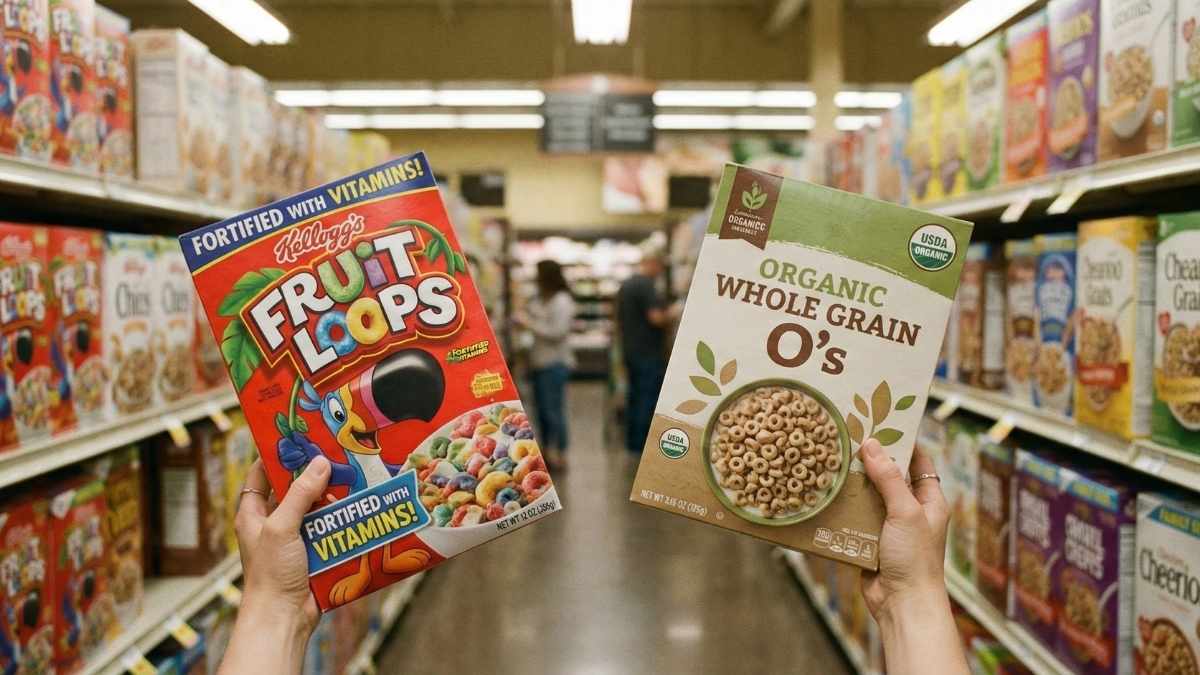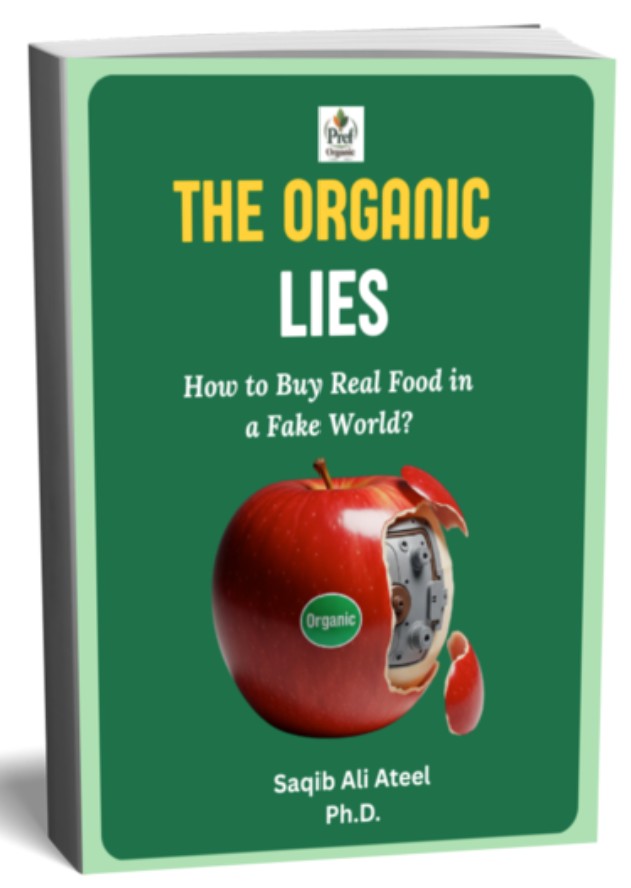Fortified Food vs. Organic One: A PhD Farmer's Honest Verdict for Your Family ❤️
You’re standing in the cereal aisle, a place I know well. In your left hand, you hold a box with the proud green "USDA Organic" seal. On your right, a brightly colored box, your kids' favorite, boasting that it's "Fortified with 12 Essential Vitamins and Minerals." You feel frozen, caught between two seemingly "healthy" choices, asking a question I hear all the time: "Which is actually better for my family?"
You’re a protector, and you’re right to be skeptical. Is fortification just a trick to make sugary cereal seem healthy? And is organic worth the extra cost if the other box has added vitamins? You need a clear verdict from a source you can trust.
I understand this dilemma completely. As a PhD scholar, I've studied the science of fortification, a genuinely brilliant public health achievement. As a farmer who grew up with his hands in the soil, I live by the philosophy of organic. I shall put these two labels side-by-side and give you an honest, practical answer.
Let's get you the clarity and confidence you deserve.
🤯 Stop Guessing in the Grocery Aisle: Your Takeaway
- ✅ Fortified: It's a "brilliant scientific solution" to fix deficiencies by adding often isolated, lab-created nutrients.
- 🚫 Organic: This is a holistic farming philosophy focused on prevention—keeping out chemicals, synthetic pesticides, and GMOs to grow naturally nutrient-dense food.
- 🛑 The Problem: Fortification doesn't address the core issues—the underlying ingredients may still be conventionally grown, exposed to pesticides, or high in sugar.
- 🥇 The Verdict: Prioritize Organic, Whole Foods as your family's strong foundation, and use fortified items as a "smart safety net" or "insurance policy" for essential nutrients.
What Are Fortified Foods? A Brilliant Scientific Solution
🔬
To start, we need to understand “what are fortified foods?”. At its core, food fortification is the process of adding essential micronutrients—vitamins and minerals like iron, Vitamin D, and folic acid—to everyday staple foods.
Think of your body like a high-performance car. You can fill it with gasoline (calories), but if you don't have enough motor oil (micronutrients), the engine will eventually break down. Fortification is like ensuring every gas station has high-quality motor oil available, making it easy for every car to run smoothly.
This isn't a marketing gimmick; it's one of the greatest public health successes of the 20th century. Adding iodine to salt practically eliminated goiter in the U.S. Adding folic acid to flour has dramatically reduced the rate of certain birth defects. So, what does fortified food mean? It means that food is being used as a vehicle to deliver crucial nutrients and prevent widespread deficiencies. It is an intervention-based approach: identify a problem (a nutrient deficiency) and add a solution (the nutrient).
What Is Organic Food? A Holistic Farming Philosophy 🌱
Organic is an entirely different philosophy. It's not about what's added to the food in a factory; it's about how the food is grown from the very beginning.
Think of building a house. The organic approach is like building with strong, high-quality, natural materials from the foundation up—solid wood, stone, and steel. The structure is inherently strong and resilient.
The organic philosophy is a systems-based approach. It believes that by nurturing healthy, living soil and a balanced farm ecosystem, the plant itself will be more resilient and nutrient-dense. It's about building health from the ground up, a principle I learned on my family's farm and live by in my own home garden. It's a promise that connects the food on your plate back to the health of the land.
The Head-to-Head Comparison: Fortified vs. Organic 🛡️
So, you're in the aisle, holding the two boxes. Let's put them side-by-side and see how they stack up on the things that matter most to you as a parent.
 From Lab to Land: Fortification is rooted in the precision of the lab, while the organic philosophy is rooted in the health of the land.
From Lab to Land: Fortification is rooted in the precision of the lab, while the organic philosophy is rooted in the health of the land.This image captures the two worlds our food now comes from: one rooted in the soil of the farm, the other born in the precision of the lab. It’s a powerful snapshot, but true confidence is not built unless you go a little deep.
In the table below, we will put each of these philosophies under the microscope. We'll compare what they promise to what they actually guarantee, and I'll give you my honest farmer's verdict on each one. This is how we move from a quick understanding to true, lasting confidence.
| Feature | Fortified Foods | Organic Foods |
|---|---|---|
| Core Philosophy | Intervention: Adds specific, often synthetic, nutrients back into food to fix deficiencies. | Prevention: Creates a healthy ecosystem from the soil up to grow naturally nutrient-dense food. |
| Farming Practices | No Requirements. The underlying ingredients can be (and often are) grown using conventional methods with synthetic pesticides and GMOs. | Strict, Legal Requirements. Prohibits most synthetic pesticides, fertilizers, and all GMOs. Focuses on soil health and biodiversity. |
| Nutrient Source | Isolated. The added vitamins and minerals are often created in a lab and added individually. | Holistic. Nutrients are delivered in their natural, whole-food form, surrounded by fiber, enzymes, and phytonutrients that work in synergy. |
| Processing Level | Often Highly Processed. Fortification is most common in refined products like white flour, sugary cereals, and processed snacks. | Focus on Minimal Processing. The philosophy encourages keeping food as close to its natural state as possible. |
The PhD Farmer's Verdict: Which is Better for Your
Family? 💪
As a scholar, I have immense respect for the public health miracle of fortification. It has saved millions of lives and continues to be a vital tool against malnutrition.
But as a farmer and a parent, my verdict is clear.
While fortified foods are an excellent patch for a leaky system, an organic, whole-foods approach is a far better way to build a strong foundation.
Here’s why. The question is not just what a fortified food is, but what the source of that food is. Fortification doesn't erase the fact that the underlying cereal may be made from conventionally grown grains that were exposed to synthetic pesticides. It doesn't change the high sugar content. It's a brilliant solution to one problem (micronutrient deficiency) that doesn't address the other concerns you, as a parent, rightly have.
The organic philosophy is more holistic. It seeks to prevent problems from the start. By building healthy soil, you get healthier plants. By avoiding synthetic pesticides, you reduce your family's chemical load. By focusing on whole foods, you get a complex symphony of nutrients that work together, not just a handful of isolated vitamins added back in a lab.
Your Action Plan: The Best of Both Worlds
Your goal should be to prioritize a diet rich in organic, whole foods first. This is your foundation.
1. Prioritize Organic for "High-Frequency" and "Thin-Skinned" Foods: The foods your kids eat every day and produce where you eat the skin.
2. Use Fortified Foods as a Smart "Safety Net": Don't fear fortified foods! For certain staples like bread, milk, or a simple breakfast cereal, choosing a fortified option can be a smart, affordable way to ensure your family is getting key nutrients like Vitamin D and iron, especially if a 100% organic diet isn't always possible.
3. Always Read the Whole Label: Whether it's fortified or organic, your best tool is the ingredient list and the "Added Sugars" line. A fortified, low-sugar whole-grain bread is a great choice. A fortified sugary cereal is still a treat.
You came here looking for a simple answer, and here it is: Focus on building your house with the strongest organic materials you can. Then, use fortified foods as an innovative and valid insurance policy. This balanced approach will give you the ultimate peace of mind.

Meet Saqib
Saqib Ali Ateel is a PhD Scholar by training and a "student of the soil" by nature. He combines deep research, hands-on farming wisdom, and agricultural systems supervision to reveal what’s really on your plate. His mission is simple: to help your family navigate the food industry's complexity so you can eat cleaner, safer, and smarter.
External Resources for Deeper Learning:
- World Health Organization (WHO) - Food Fortification
- Food and Drug Administration (FDA) - Food Fortification Policy


